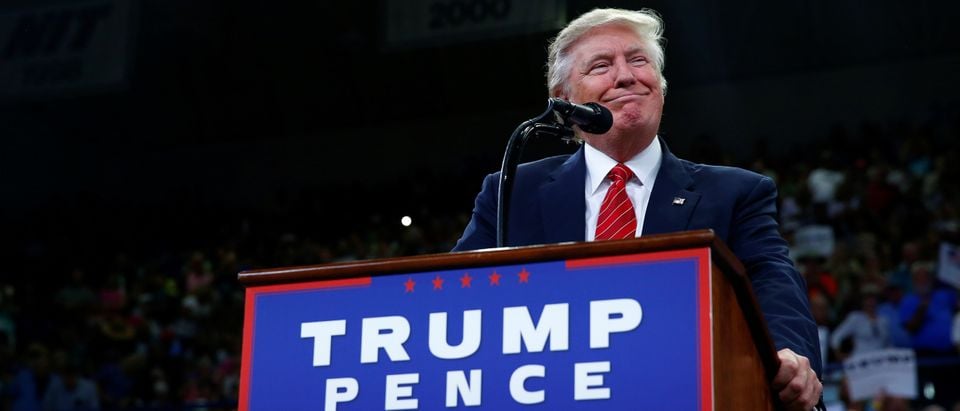Donald Trump delivered two well-received policy addresses over the past week – one on his plans for the economy, the other on his approach to national security and defense.
But you’d hardly know it from the way Hillary Clinton and her media allies have desperately tried to knock Trump’s speeches off the front pages.
Last month’s RNC convention appears to have provided a real wake up call for Clinton and her media allies. They insisted on depicting the event as a “gloom and doom” affair that offered only a “dark” version of America’s future.
But when CNN/ORC conducted a poll of their viewers, they were shocked to find that the billionaire real estate mogul had scored big with voters.
A whopping 57 percent said they had a “very positive” reaction to the speech, while only 24 percent said the speech had a “negative” effect. And the speech left 56 percent of viewers saying they were “more likely” to vote for Trump.
Ever since, Clinton’s campaign has worked overtime to try to discredit Trump and to drive a wedge between his campaign and mainstream voters. And an anxious media – shocked at Trump’s continuing staying power – has appeared all too willing to assist her
When Trump appeared before the Detroit Economic Club a week ago, 50 ex-national security officials who served in GOP administrations – mainly under the two Bushes – released a letter questioning Trump’s ability to serve as Commander-in-Chief.
The mainstream media had a field day, even though many of these same officials had released a similar letter last March to try to stop Trump’s drive toward the GOP nomination – to no avail.
And they made no mention of numerous senior GOP national security officials not on the list, including Dick Cheney to Donald Rumsfeld, both of whom have publicly endorsed Trump.
This week Trump outlined his strategy for combating Islamic terrorism and his overall “America First” approach to foreign and defense policy.
It was one of Trump’s best speeches to date, and reflected a shift in tone – and a “pivot” – to try to appeal to nervous mainstream voters. Trump surprised many observers by calling for an international conference of Western nations to devise a fresh strategy for combating ISIS.
It stood in sharp contrast to earlier Trump statement that he would simply walk away from NATO and take the fight to ISIS alone, if necessary.
But Democrats, anticipating the impact of Trump’s speech, responded by trotting out Vice President Joe Biden to issue a broadside attack on Trump as “the most unqualified presidential candidate in US history. “
Biden said that Trump admired foreign dictators and even went so far as to suggest that the former reality TV star “would have loved Joseph Stalin.”
Every mainstream media organ led its daily story on the campaign with Biden’s ad hominem attack on Trump, completely overshadowing the substance of Trump’s address.
FOX media reporter Howard Kurtz says reporters and editors hostile to Trump feel that the GOP standard-bearer is so “dangerous” that “normal” media rules simply don’t apply. They’re “coming out of the closet” with their bias, he argues.
Arguably, Trump’s campaign has committed some painful and self-defeating verbal gaffes of its own that have placed the candidate on the defensive.
But the media seems to be taking its own revenge, openly joining forces with Clinton to try to sabotage Trump’s efforts to rebound and reboot his campaign.
Will the balance shift again when the two candidates square off in the nationally televised debates in late September?
Both are likely to get grilled in front of a live audience. And with more damaging email revelations in the offing and the possibility of more terror attacks, the billionaire real estate mogul might well recoup lost ground.
But not if Clinton and her media allies can damage Trump fatally now – boosting her polling lead, driving a deeper wedge between Trump and his party, and making a future Trump comeback all the more unlikely.
Without a more effective counter-strategy, fall could prove just as damaging to Trump’s campaign and prospects for victory as summer was.
Stewart J. Lawrence is a Washington, D.C.-based public policy analyst who writes frequently on immigration and Latino affairs. He is also founder and managing director of Puentes & Associates, Inc., a bilingual survey research and communications firm.


